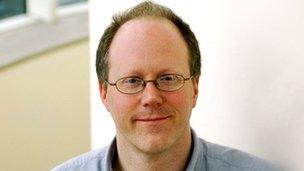Profile: George Entwistle
- Published

Entwistle started his career at the BBC as a journalism trainee in 1989
George Entwistle has resigned as director general of the BBC in the wake of the Newsnight broadcast which wrongly implicated ex-senior Tory Lord McAlpine in a child sex abuse scandal.
Mr Entwistle took up the post of director general on 17 September.
He was selected by a panel from the BBC Trust, the governing body of the BBC, led by chairman Lord Patten.
Before that, he was Director of BBC Vision, a post he held since April 2011 and one which he has described as "one of the best television jobs in the world, if not the best".
It involves overseeing all of the BBC's major TV channels, including BBC One, BBC Two, BBC Three, BBC Four and BBC Films, and being a member of the BBC's Executive Board.
As part of this, he recently had responsibility for the BBC coverage of the Queen's Diamond Jubilee. The event attracted more than 4,500 complaints, mainly about the tone of presentation at the river pageant.
Ample experience
Having grown up in Yorkshire, Mr Entwistle studied Philosophy and Politics at Durham University before starting his career at Haymarket Magazines as a writer and magazine editor.
On joining the BBC as a trainee, he worked as an assistant producer on Panorama, covering the first Gulf War and the fall of Margaret Thatcher.
In January 1993, Mr Entwistle became a producer for On The Record, before joining BBC Two's flagship current affairs programme Newsnight.
There he rose from producer to editor, taking up his post in 2001 one day before the 9/11 terrorist attacks.
Prior to that Mr Entwistle had spent time away from current affairs, joining the science department for two years in 1999 to become deputy editor of BBC One show Tomorrow's World.
In 2004 he left Newsnight for a new Topical Arts Unit in BBC Arts, where he launched BBC Two's The Culture Show and executive produced arts films.
In late 2005 he was appointed Head and Commissioning Editor of TV Current Affairs.
As part of BBC Television's factual commissioning team, he and Peter Fincham, then Controller of BBC One, brought Panorama back to a weekday peak-time slot.
He commissioned documentary series including The Conspiracy Files and Michael Cokerell's series Blair: The Inside Story.
In his next role, as acting controller of BBC Four, Mr Entwistle was in charge of the channel during the first runs of Mad Men and Flight Of The Conchords.
He also commissioned the Golden Age of Steam season, which saw the channel achieve huge ratings for shows such as Julia Bradbury's Railway Walks series and Ian Hislop's documentary on the Beeching closures.
In January 2008 Mr Entwistle became Controller of Knowledge Commissioning, where he championed high-profile seasons such as 2010's World of Wonder.
The year of science programming on the BBC increased its science audience reach by more than four million people.
He also oversaw a range of award-winning programmes including Life, Boys Don't Sing and Blood, Sweat and T-Shirts.
Before being appointed Director of BBC Vision in April 2011, Mr Entwistle coordinated the coverage of 2010's Papal Visit across radio and television and spent time working on Mark Thompson's Creative Future strategy review.
As acting director of BBC Vision, he was responsible for the move of QI back to BBC Two and triple RTS award-winner Miranda to BBC One.
When interviewed about applying to take the job on permanently he said he had "an enormous amount of passion" for the BBC.
"It's a fantastic organisation and I love it as deeply as it's possible to love an organisation," he added.